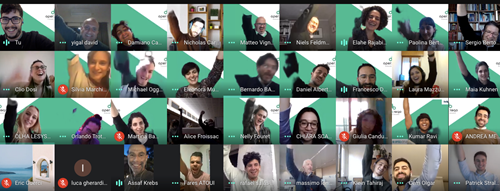CRIF takes part in SUGAR Expo Cloud alongside the University of Bologna and TU Dortmund University
SUGAR Expo Cloud is one of the most important global innovation events in the world, promoted by SUGAR, the largest international network bringing together universities, businesses, and global organizations with the aim of working together on the future of innovation and creating new solutions with a real impact on society and people.
Among the participants of the event, normally held in California but this year held entirely online on June 1, was a team of students from the University of Bologna, in collaboration with Almacube and the University of Modena and Reggio Emilia.
CRIF, together with its global innovation hub InnovEcoS, partnered with the University of Bologna and TU Dortmund University, challenging the team of students on how to rethink the relationship with Generation Z to bring them closer to the world of finance, sustainability, and data.
“In a rapidly evolving market context, the dramatic acceleration brought about by new demands arising from the pandemic on the one hand, and by technological innovation on the other, represents a point of no return,” commented Natalia Shchelovanova, Global Innovation and Ecosystem Lead at CRIF.
“Continuous innovation has always been at the heart of CRIF’s DNA, but in recent years we have accelerated further along this path, developing a series of service modules and components capable of delivering true open business and digital transformation models that allow us to seize all opportunities thanks to an ecosystem approach. Taking part in initiatives such as SUGAR is an extraordinary opportunity for us to initiate and sustain a virtuous cycle, which sees us working alongside young talent and new entrepreneurship,” added Beatrice Rubini, Executive Director at CRIF.
Before taking part in this global event, the work started nine months ago, involving 17 teams of students coming from around 25 international universities. The teams worked on a series of innovation challenges proposed by a panel of companies and international organizations. To do this, a Design Thinking approach was adopted: an approach to research where the users we are designing for are always at the heart of the process, with continuous transformations between the various developments of the ideated solutions, which are applied in the field and revised with prototypes and tests.

